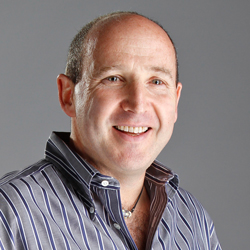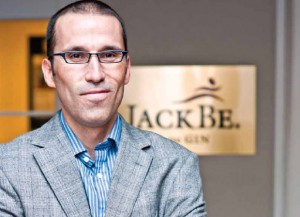Great Mexican startup founders I met while at Intel Capital
 It’s not been twelve years since I was living in Mexico and working as a Strategic Investments Manager for Intel Capital. It was during that stint that I developed my long term objective of some day launching my own seed fund. I’ve even given that eventual fund a name: Tayrona Ventures. In part, that dream arose from the frustration of sometimes seeing great entrepreneurs and startups that don’t fit the perceived corporate investment philosophy at headquarters. Either way, my time at Intel Capital convinced me that this was what I wanted to do (but with more freedom) and it did enable me to meet amazingly impressive people, among them, two specific entrepreneurs.
It’s not been twelve years since I was living in Mexico and working as a Strategic Investments Manager for Intel Capital. It was during that stint that I developed my long term objective of some day launching my own seed fund. I’ve even given that eventual fund a name: Tayrona Ventures. In part, that dream arose from the frustration of sometimes seeing great entrepreneurs and startups that don’t fit the perceived corporate investment philosophy at headquarters. Either way, my time at Intel Capital convinced me that this was what I wanted to do (but with more freedom) and it did enable me to meet amazingly impressive people, among them, two specific entrepreneurs.
Before talking about these two entrepreneurs, a little bit more about my stint at Intel Capital. While I really loved what I did, I was pretty bad at dealing with the corporate subsidiary infighting and the follower mentality of local directors. I do remember the first deal I presented, a great tax software company called MasterSaf from Rio de Janeiro that recently got acquired by Thomson Reuters. As I was doing due diligence for this deal, I realized that I really took to analyzing companies and their founders and, most importantly, “betting” on a select few. I had the good fortune to have many sessions with the founder, Martin Janders, which I really enjoyed. It’s amazing that I did enjoy it so much since his language was Portuguese, which I don’t know although I got pretty good at deciphering it after a while. Needless to say, I was extremely confident of the merits of investing in this company.
What I wasn’t so confident about was coming face to face (or through conference call) with the legendary (and scary) Les Vadaz, part of the founding team that created Intel and the founder and President of the Intel Capital division. Just a few short months ago, I was doing business development of Intel’s chip, motherboard and server business in the Northern Cone of South America. During my training period at Intel Capital, I spent quite a bit of time listening to presentations by my colleagues from Israel, USA and other countries and heard how, sometimes, Les would tear into the presenter for being unprepared or uttering, what he considered, nonsensical statement.
When the morning of my presentation of this first deal arrived, I was more than scared. Nonetheless, although I started off with the typical crackly voice, I started to gain more confidence as I went down the points of the deal. Now, sometimes, even if a deal was approved, there was a lot of extra homework that was given (e.g., find out more about their response to such and such a competitor, etc.) before any investment could be made. To my amazement, after one or two questions, the deal was approved. Needless to say, the legal folks at Intel decided to pass on the investment (as was their prerogative), but as Strategic Investments Manager, I had presented the merits of the deal, which included the financial aspects (analyzed by a financially focused colleague) and it was cleared for investment.
I presented three more deals (e.g., channel partner, software companies); all received approval. While my colleagues were able to get perhaps one or two of these approved (some after several presentations), I got the four that I presented that year approved after the first presentation. Nonetheless, there was a deal that didn’t fit the common wisdom of VC investing that I felt strongly about presenting which I know would have been much more challenging to get approved. Not only did I not get to present this deal, but I got sent to the dog house for proposing it. 
The deal was for a company called Kio Networks, a new high quality data center set to offer managed services. The only problem was the a number of these had just flamed out in the states in spectacular fashion. One of these, Exodus Communications, was fresh on everyone’s mind. Nonetheless, I was convinced that Latin America needed more of these types of high quality data centers. The founders of Kio Networks had even contracted with a California consulting company to design the whole thing with appropriate redundancy.
 After several months talking with an impressive group of individuals which included Maria Aramburuzabala (extremely professional and personable) and an amazing founder and CEO called Sergio Rosengaus, I was ready to present their deal to the Investment Committee, but, first, I had to get approval from the Latin American heads (Business Development and Financial) of Intel Capital. As opposed to almost all of the startup CEOs who had come to our offices, Sergio did not need our money and had a clear vision for his company and detailed plan on how to achieve it. In fact, he mostly attended the meeting at Intel Capital because of our relationship and because I asked him to explore the possibility of our investing in his company.
After several months talking with an impressive group of individuals which included Maria Aramburuzabala (extremely professional and personable) and an amazing founder and CEO called Sergio Rosengaus, I was ready to present their deal to the Investment Committee, but, first, I had to get approval from the Latin American heads (Business Development and Financial) of Intel Capital. As opposed to almost all of the startup CEOs who had come to our offices, Sergio did not need our money and had a clear vision for his company and detailed plan on how to achieve it. In fact, he mostly attended the meeting at Intel Capital because of our relationship and because I asked him to explore the possibility of our investing in his company.
After setting up a meeting between Sergio, his team and my boss, we had an internal meeting to discuss this “deal.” Without going into details, my presenting this deal to my boss, made him rethink whether I knew what the “you know what” I was doing (regardless, of what I had already accomplished). This action, to him, seemed incredibly out of character as he couldn’t understand how, someone who seemed to be in tuned with the current trends, could present a deal in a space that was not getting funded in the states (and at headquarters) and had just witness spectacular flame outs.
Needless to say, Kio Networks and Sergio Rosengaus have been tremendously successful and recently announced that they’ll be investing over US $120M as they expand their data centers across Latin America. There’s been a lot written in the last few years about the Venture Capitalist herd mentality and here was an example that I experienced first hand. My Latin American bosses at Intel Capital actually thought they were in the driver’s seat and companies that didn’t get funded were losing out. This blinded them to the reality: thinking that way, makes VC’s lose out on a disruptive, counter-intuitive players who would have provided strategic and financial value to the company. Also, instead of listening to my reasons for wanting to present this deal, they were more driven by a desire not to be embarrassed in front of the Investment Committee in Santa Clara, which may have actually approved the deal if allowed to hear the arguments for it.
 Now, for the second impressive entrepreneur – this time with a positive outcome for Intel Capital. An incredibly capable and driven CEO named Luis Derechin was at the helm of a web software company focused on the Pharmaceutical sales process. One of the key differentiators was the responsiveness of the software even using a dialup connection – this was the first time I had seen an application that made use of AJAX technologies. I had already seen his demo and his pitch, but what was much more impressive was Luis, his passion and his experience as an entrepreneur.
Now, for the second impressive entrepreneur – this time with a positive outcome for Intel Capital. An incredibly capable and driven CEO named Luis Derechin was at the helm of a web software company focused on the Pharmaceutical sales process. One of the key differentiators was the responsiveness of the software even using a dialup connection – this was the first time I had seen an application that made use of AJAX technologies. I had already seen his demo and his pitch, but what was much more impressive was Luis, his passion and his experience as an entrepreneur.
One day, a number of investors, including myself, heard his pitch and then went into closed doors to discuss what we had heard while Luis and his team waited outside. During the meeting, there were a number of comments about the software, the industry he was attacking and other issues. The general consensus was that though the product was very good, it was attacking a niche market. Also, not everyone found Luis’ type A personality agreeable. 
My comment was that what these guys should do was build a tool that would enable other companies to create applications like the one they had created. The other investors in the room agreed that this course had the most promise and we conveyed this message to Luis. Though he wasn’t thrilled at our decision to not invest, he took the advice extremely well and quickly began to implement that specific strategy (he “pivoted” before there was a term for this action).
Needless to say, that company became a great success and continues to innovate by providing tools to create great dashboards and front-ends to corporate apps. He named it JackBe and moved the headquarters to Washington DC. Also, Intel Capital invested in it after I had left Intel. Executing on all of this took amazing skills and persistence. Sergio and Luis, in very different ways are leaders and talented entrepreneurs that I remember extremely well and hope to identify many like them (before they achieve their visions) as I continue down my own road.


